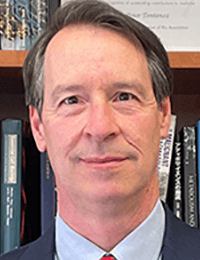The 2003 ASCI Award: Craig B. Thompson, MD
Craig B. Thompson, MD, received the 2003 ASCI Award in recognition of his discovery of the critical role costimulatory receptors play in regulating immune responses. He was the first to demonstrate that CD28 regulates cytokine production, lymphocyte survival, and immune homeostasis. These pioneering studies have contributed to novel treatments for autoimmune disease, transplantation rejection, cancer, and AIDS.
Dr. Thompson is a clinical hematologist/oncologist who started his independent research career by investigating how bone marrow transplant patients mounted antiviral immune responses while on immunosuppressive doses of cyclosporin A. His study of this issue has led to pioneering contributions to basic immunology. His laboratory was the first to uncover the central role of the CD28 costimulatory pathway in the regulation of cytokine production by T cells. The Thompson Laboratory also demonstrated that CD28 contributes to T cell clonal expansion by inhibiting apoptosis, leading to the cloning of the anti-apoptotic genes Bcl-x and XIAP and the development of methods for the in vitro expansion of human CD4 T cells now in use for cancer immunotherapy and HIV treatment. In a landmark series of papers, Dr. Thompson and his colleagues identified the receptor CTLA-4 as a negative regulator of CD28 activation. These pioneering observations led to the current intense clinical investigation of both anti-CD28 Ab and soluble CTLA-4 receptors for the treatment of transplant rejection and autoimmunity.
Dr. Thompson has made a number of other seminal contributions to the understanding of immune cell development, survival, and transformation including: 1) co-discovery of gene conversion as a mechanism of immunoglobulin diversification in avian species, 2) discovery of P nucleotide addition during VDJ recombination, 3) identification of antigen receptor engagement as the mechanism for terminating receptor rearrangement, 4) discovery of the pore forming properties of Bcl-2 proteins and the role of these and related proteins in the regulation of mitochondrial physiology, and 5) discovery of the central but redundant regulatory roles of Bax and Bak in apoptosis.
Dr. Thompson received his undergraduate degree from Dartmouth College and his M.D. degree from the University of Pennsylvania. He received clinical training in Internal Medicine at Peter Bent Brigham Hospital and in Medical Oncology at the Fred Hutchinson Cancer Research Institute at the University of Washington. He is currently the Scientific Director of the Abramson Family Cancer Research Institute and Professor and Chairman of the Department of Cancer Biology at the University of Pennsylvania. In addition to his research contributions, Dr. Thompson has mentored over two dozen students and fellows who have gone on to successful careers in academic medicine.


